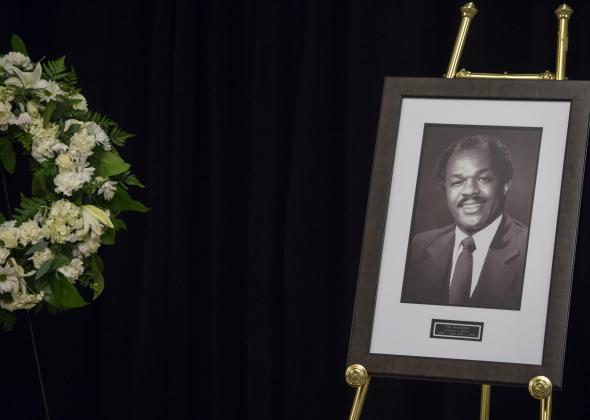Since his death on Nov. 23, Washingtonians have continued to mourn the passing of Marion Barry, Washington, D.C.’s idiosyncratic four-term mayor and longtime city councilmember. Earlier this week, a group of Barry’s colleagues and supporters held a small public memorial service on the steps of the mayor’s office. But remembering Barry’s life was suddenly sidetracked when the event’s emcee unexpectedly spouted homophobic and sexist sentiments. Some prominent event participants are now taking flack for not intervening. But when is it appropriate to confront a person who unleashes offensive speech?
During Barry’s memorial, Al-Malik Farrakhan—a local gang-rehabilitation advocate and the event’s emcee—urged ex-offenders to develop a political agenda. (So far, so good.) Then Farrakhan chose to emphasize his point by telling ex-offenders to “stop acting like faggots” and “prostrating themselves like females.” Whoa. At that moment, City Councilmember Vincent Orange and other participants were standing behind Farrakhan, seemingly unfazed by the homophobic and sexist remarks. (Orange has since condemned them.) Now many are questioning why Orange didn’t immediately step in.
What are you supposed to do when somebody says something horrible during something like a eulogy? What about when Grandpa’s tipsy wedding toast suddenly takes a homophobic turn? Or when the minister performing the ceremony takes extra time to emphasize “ONE MAN and ONE WOMAN”? (We get it, you are NOT marrying two guys.)
As a member of the LGBTQ community, it can be difficult to stand idly by while somebody demeans your very existence—or someone else’s for that matter. But in most cases, you should bite your tongue, take a deep breath, and assess the situation.
If the event in question is not about you (a wedding reception or a eulogy, say), tough it out. As tempting as it is to publicly shame your bigoted uncle, pursuing an on-the-spot response to homophobic remarks will only make things worse. Do your sister a favor, and hold your tongue on her wedding day. Don’t make your grieving mother faint at Grandma’s funeral. Families can be tricky territory for gays to navigate, and your dignity isn’t necessarily the No. 1 priority on someone else’s big day. While there is a way to carefully wrest the mic from grandma’s hand (“Thank you, Gran, for those touching words!”) while giving a wink and a nod to the audience, it’s best done by someone else. Besides, there are probably people in the room who are just as mortified and offended as you. If you’re out, you’ll look much bigger if you address the situation privately.
After the event (preferably in a sober environment), confront the person who made the homophobic remarks. Explain how harmful those words are to members of the LGBTQ community, and share how they make you feel. Give them a chance to make things right. Hopefully, many years down the road, you and your siblings will be able to laugh about crazy Uncle Bubba’s ridiculous drunken, homophobic wedding speech.
There are times where it is fair game to interject. For example, if someone utters a gay slur during a political event or lecture, feel free to stand up and shout. Intellectual forums are fair game for admonishment. Events with group participation are OK, too. Just make sure you respond with well-thought-out words.
Finally, if it’s all too much, you can simply leave. This isn’t fair or just, but it goes a long way to preserve personal dignity and sanity. Wait for an appropriate moment, and slip out of the event. If there’s an open bar, grab a glass of bourbon and some hors d’oeuvres on your way out. Puff pastry makes everyone feel better.
